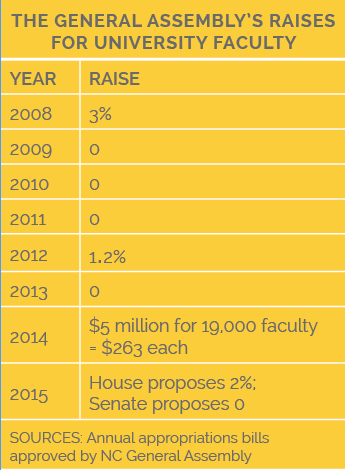It’s been seven years since teachers and researchers at North Carolina’s public universities have seen a meaningful raise.
Seven years when university instructors have coped with $700 million in budget cuts across the system. Seven years when researchers have worked harder than ever to secure vital grant dollars as the federal government reduced funding. Seven years when other states began to recover and reinvest in higher education.
State legislators provided university faculty with a 3% raise in 2008. They approved a 1.2% raise in 2012. Last year they authorized $5 million for raises to be spread across 19,000 teachers on 16 campuses – an average of $263 each.1 This year the NC House proposes a raise of 2% for university instructors,2 while the NC Senate would provide none.3
Since they received that 3% raise in 2008, the men and women who teach at our public universities have seen their salaries stagnate, failing to keep up with baseline inflation. Social Security payments have kept up with the cost of living; in North Carolina, salaries for public university instructors have not.4
Public school teachers faced a similar situation until last year, when state lawmakers were finally moved to action. North Carolina teacher salaries dropped to nearly the worst in the nation and school systems as far away as Houston held recruitment fairs in our state before legislators granted K-12 teachers a raise that averaged 5.5%.
That came too late to stop many talented teachers from leaving. And it came too late to stop enrollment in teacher-education programs from dropping by 27%, creating an impending shortage of educators that will affect our public schools for years.
Allowing university professors to keep falling behind would have equally dire consequences. At a time when competing states have been reinvesting in higher education, North Carolina’s lagging pay and sagging morale make our instructors and researchers ripe for poaching.
In the two years that ended in June 2014, the University system lost 3 out of 4 retention battles – 320 in all – when a faculty member had a competing offer.
That means the loss of valuable classroom experience and valuable grant dollars – 93 of the researchers who left North Carolina had grants that totaled $91 million.5
It means students lose important mentoring relationships and campuses bear even more expense searching for replacements. As with public school teachers, stagnation in pay for university faculty ultimately hurts students and their families.
We shouldn’t have to sink to the bottom – again – to treat them right. Legislators should give university faculty the 2% raise backed by the NC House.
1 http://www.ncleg.net/sessions/2013/budget/2014/Committee_Report_2014-07-30_final.pdf, p. F-11.
2 http://www.ncleg.net/sessions/2015/budget/2015/House_Committee_Report_as_modifiedbyrules_2015-05-21.pdf, p. F11.
3 http://www.ncleg.net/sessions/2015/budget/2015/Senate_Committee_Report_2015-06-17.pdf, p. F-10.
4 http://www.ssa.gov/news/cola/facts/
5 UNC General Administration, “Faculty Retention Efforts Summary, July 2012-June 2014,” August 13, 2014, p. 1.


Leave a Reply